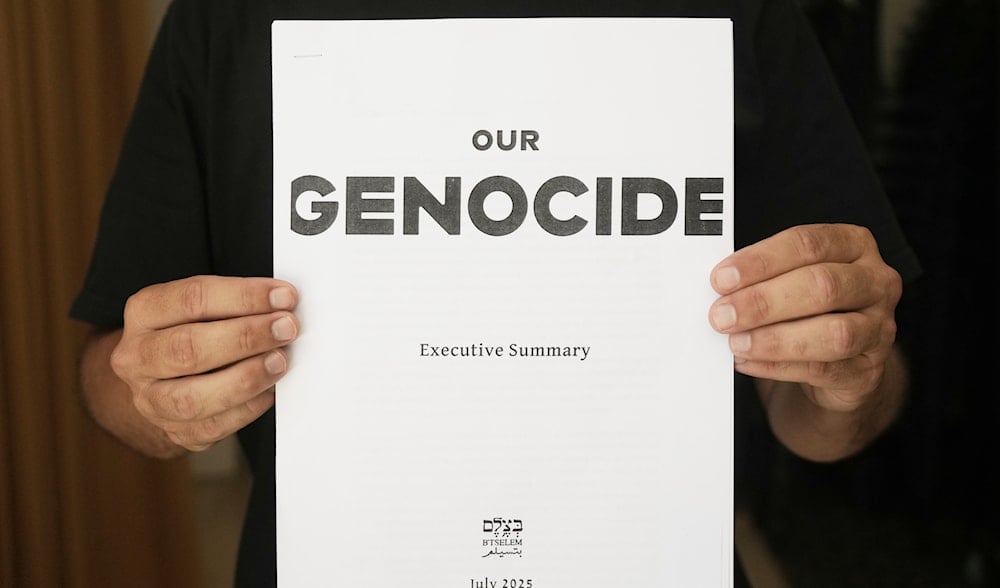Israeli rights groups accuse 'Israel' of committing genocide in Gaza
B’Tselem and Physicians for Human Rights accuse "Israel" of committing genocide in Gaza, citing systematic targeting of Palestinian civilians, healthcare destruction, and Western complicity.
-

A copy of the executive summary of "Our Genocide," a report by B'Tselem, is displayed by a journalist at a press conference by the group, along with PHRI releasing the report calling the war in Gaza a genocide, Monday, July 28, 2025 (AP)
Two of the most prominent Israeli-based rights organizations, B’Tselem and Physicians for Human Rights (PHR), have accused "Israel" of committing genocide against Palestinians in the Gaza Strip, emphasizing that Western nations have both a legal and moral responsibility to intervene.
In separate reports published on Monday, B’Tselem and PHR asserted that "Israel" has deliberately targeted Palestinian civilians in Gaza for nearly two years of war, inflicting severe and irreparable harm to Palestinian society.
Evidence of targeting Palestinian civilians
The reports, based on extensive documentation, outlined a consistent pattern of atrocities: the killing of tens of thousands of women, children, and elderly Palestinians; mass forced displacement; deliberate starvation; and the systematic destruction of homes and vital infrastructure. These actions have deprived Palestinians of access to healthcare, education, and other fundamental rights.
“What we see is a clear, intentional attack on civilians in order to destroy a group,” said Yuli Novak, director of B’Tselem. “I think every human being has to ask himself: what do you do in the face of genocide?”
Novak stressed the need to recognize genocide even without a formal ruling from the International Court of Justice (ICJ), stating that genocide is not only a legal issue, but also a political and social reality.
Gaza's healthcare system deliberately crippled
Physicians for Human Rights focused its report on the destruction of Gaza’s health sector, providing a detailed chronology of events backed by on-the-ground documentation. PHR had maintained a consistent medical presence in Gaza prior to 7 October 2023.
According to PHR director Guy Shalev, the collapse of the healthcare system constitutes genocide under Article 2(c) of the Genocide Convention, which prohibits “deliberately inflicting conditions of life calculated to destroy a group in whole or in part.”
“You don’t have to have all five articles of the genocide convention to be fulfilled in order for something to be genocide,” Shalev explained. “This is what the genocide convention calls for.”
PHR also warned that the destruction of Gaza’s medical system will have lasting consequences even after any ceasefire. With no MRI machines and significant shortages in medications, many diseases and conditions remain undiagnosed and untreated.
Shalev explained that the loss of specialized medical staff, who took decades to train, cannot be reversed quickly. “Looking at the conditions of life opens this kind of temporal scale that is frightening,” he said.
Western complicity and legal obligations
Both organizations criticized "Israel’s" Western allies for enabling the campaign, stressing shared responsibility for the suffering in Gaza. “It couldn’t happen without the support of the Western world,” Novak stated. “Any leader that is not doing whatever they can to stop it is part of this horror.”
Shalev added that Western countries, including the US and European nations, have legal obligations under the Genocide Convention to act decisively: “Every tool in the toolbox should be used.”
Genocidal intent and documentation
"Israel" continues to deny accusations of genocide, framing its war on Gaza as self-defense in response to the 7 October operation by Hamas.
Nonetheless, the reports argue that intent, a key element of the crime of genocide, can be inferred from public statements by political and military leaders, and from the consistent, long-term impact of policies targeting Palestinian civilians.
The PHR report referenced legal precedent from the International Criminal Tribunal for Rwanda, noting that genocidal intent “may be inferred from the pattern of conduct.”
Shalev emphasized that "Israel" could not plausibly deny awareness of the outcomes of its actions: “There were enough times and enough opportunities for Israel to stop this gradual systematic attack.”
Incitement to genocide has also been documented since the beginning of the war. The ICJ, in its preliminary measures, acknowledged the plausible risk of genocide, with even the Israeli judge voting in favor of those protections.
Novak highlighted the rhetoric from Israeli leaders: “They talked about human animals. They talked about the fact that there are no civilians in Gaza or that there is an entire nation responsible for 7 October.”
“If the leadership of Israel... knows about the consequences of this policy and keeps going, it is very clear that is intentional,” she added.
Spillover risk to the West Bank
B’Tselem’s report warned that the genocidal campaign in Gaza could extend to other areas, particularly the West Bank, where nearly 1,000 Palestinians have been killed and over 40,000 displaced from communities including Jenin and Tulkarm since 7 October 2023.
“What we see is basically the same regime with the same logic, the same army, usually the same commanders and even the same soldiers who just fought in Gaza. They are now in the West Bank where violence is on the rise,” Novak said.
“What we worry about and want to warn about is the fact that any small trigger might make the genocide spill over from Gaza into the West Bank.”

 5 Min Read
5 Min Read








